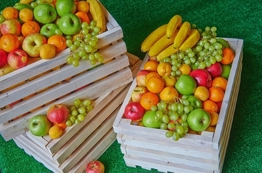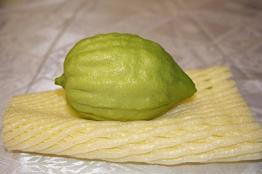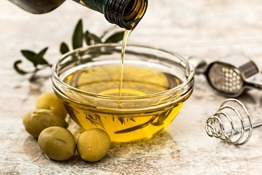When is it permissible to buy vegetables in the eighth year without knowing their shemitah status?

When and why we can buy produce on the 8th year? Did Chazal forbid sefichin even during the 8th year? An explanation of the chart put out by Torah VeHa'aretz Institute.
Click here to download the PDF file.
Click here to download the JPG file.
The laws of sefichin for eighth-year vegetables
Rambam (Shemitah 4:6-7) writes as follows: Until when are the sefichin of the Sabbatical year forbidden in the eighth year? … They should not be purchased in the eighth year until produce of that size could have grown in the eighth year. When, in the eighth year, the produce which grows rapidly reaches [the size of the produce which grew in the Sabbatical year], the prohibition is lifted from the produce that remains."
Why is this so? (see Shabbat Ha'aretz IV 7:2)
1. Relying on the fact that it may have been planted after shemitah
The Radbaz writes that the reason these vegetables are permitted since Chazal forbid only crops that are definitely sefichin. In cases where we are not sure if the vegetable was planted during shemitah, if there are already ripe crops of a similar type available, it is possible to rely on the possibility that it is permissible. This is called teliyah (lit. hanging, relying). Such crops may be eaten even though the permissible produce is the minority and the majority is still forbidden. This is the intent of "the produce which grows rapidly reaches [the size of the produce which grew in the Sabbatical year], the prohibition is lifted from the produce that remains." If there is a place where a certain type of vegetable ripens quickly, it is permissible to buy in a different place where the same type of produce is late-ripening.
- When the permissible part exceeds the forbidden part in the vegetable itself.
The Ridbaz brings another reason. Even if a given vegetable was planted during shemitah, it continued to grow during the eighth year, and was then harvested. At this point, the forbidden part of the vegetables (that grew during shemitah) is nullified by the permitted part (that grew during the eighth year). Furthermore, even though the vegetable was definitely planted during shemitah, Chazal did not forbid it at a certain point in the eighth year. This explanation is based on the Yerushalmi (Shevi'it 2:5) and Rambam (4:15), that permit eating sefichin during the eighth year even if they were definitely planted during shemitah. - We are not concerned that someone will plant clandestinely in the eighth year
Devar Hashemitah cites yet another reason. The rationale for the sefichin prohibition is that Chazal were concerned that people would plant in their fields during shemitah so they will have food to eat. They were not concerned, however, that people would plant during shemitah for the eighth year if they have a permissible alternative.
Rambam continues (4:7), citing the words of Rebbi in the Mishnah (Shevi'it 6:4): "And it is permissible to take a vegetable immediately following the seventh year." Yerushalmi (Pe'ah 7:4) expounds with a story: Rebbi was brought radishes during the asseret yemei teshuvah, and he assumed that they were sefichin and sown during shemitah. He was then told that they were planted right at the beginning of the shemitah year. "At that time, Rebbi permitted taking vegetables immediately following the seventh year." Some commentators explain that this relates to vegetables that grow quickly within several days. Others maintain that it is because one may assume the vegetable could have been imported.
Chanukah
Rambam (4:6), following the Yerushalmi (Demai 2:1), rules that Chanukah is a halachically significant date. "Until when are sefichin prohibited following the seventh year? From Rosh Hashanah until Chanukah. From Chanukah and on, sefichin are permitted." What does this mean?
Mahari Kurkus writes that starting Chanukah, it is permissible to eat even vegetables that were definitely planted during shemitah. The Chazon Ish explains that vegetables that were planted during shemitah and harvested in the eighth year, Chazal's sefichin prohibition remains in effect only until Chanukah (and about shamur and ne'evad the Chazon Ish was meikel, see here).
In contrast, Pe'at HaShulchan (22:9) explains that this relates to vegetables about which there is a doubt as to when they were planted. From Chanukah on, it is possible to rest assured that these vegetables were planted during the eighth year. That is, Chanukah is the default date to permit sefichin. At this point, even vegetables that we are not sure about when a similar crop is available, will be permitted from Chanukah on.
Explanation of the table
For most vegetables, we note Chanukah as the stage at which point it is permissible to purchase vegetables without having to check their shemitah status. Only for vegetables that definitely take a longer time to grow (for instance, onions take at least 130 days to grow, and garlic even more), we write later dates.
For hard vegetables with a long shelf-life, such as carrots and potatoes, we at Torah VeHa'aretz Institute deliberated whether it is possible to use Chanukah as the date or if we should use a later date. Ultimately, the consensus was to use Chanukah since vegetables of the same type planted in the eighth may be available at this time.
Supermarkets
Everything stated above relates to us as consumers. However, the mehadrin supermarkets that employ "Shemitah Lechumrah" solutions know what the source of the produce is. They only buy produce that was planted after shemitah, and do not rely on the chart.
Bottom Line
From Chanukah and on it is possible to buy most vegetables without special shemitah supervision. Certain vegetables that grow quickly, such as lettuce and other leafy greens, can be purchased before this time (already now, in Cheshvan). For onions and garlic, the date is later (mid-Tevet and early Nissan, respectively).





